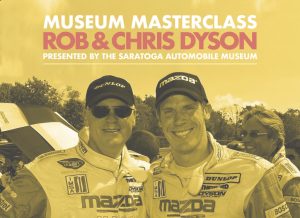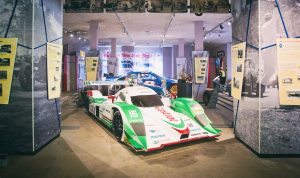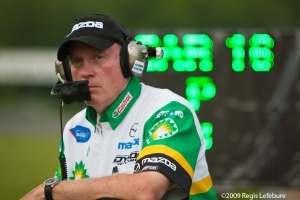Butch Leitzinger will be celebrating his 100th American Le Mans Series start at Lime Park on July 7th. A fan favorite and true sports car legend, Butch drove full-time for Dyson Racing for fifteen years and is still a member of the Dyson family having most recently driven for the team at last year’s Petit Le Mans and at Mazda Raceway Laguna Seca.
He has thirty-four victories driving for Dyson Racing including two at the 24 Hours of Daytona. He won the IMSA Sportscar Championship twice and the CanAm championship with Dyson Racing. In addition to his accomplishments as a Dyson driver, he has a third 24 Hour of Daytona victory to his credit, a 24 Hour of Le Mans podium, an IMSA GTU championship, Trans Am wins and multiple wins in NASCAR’s Busch North Series.
James Weaver, a twenty-year veteran of Dyson Racing, once said of Butch’s talent: “It is extraordinary how much ability he has. He is such a natural. He does not have to sit in the car for two hours to get a handle on it, he gets on the pace instantly. Butch always takes everything in stride and always performs superbly.”
Here is the last part of a three-part interview with Butch:
You have driven NASCAR, Trans-Am, sports car, and wide range of race cars. Is that kind of variety a thing of the past now for drivers?
“I don’t think so – there are still some people who jump around from car to car. The biggest problem is not drivers’ willingness to do it, but the teams allowing them to do it. I had the benefit of driving for my parent’s team with them being happy for me to drive anything I could and then driving for Rob and Rob always saying `as long as you are here for when I need you, than go ahead.` I have always been lucky running with real racers who appreciate the benefit of varied seat time. I think part of it was that both my dad and Rob were drivers and they both appreciated a driver’s ambition and just wanting to drive anything they could.”
What do you drive on a street?
“I have the ultra-exciting Volkswagen Jetta diesel wagon! And I also just got an Audi Q5 which is a really a brilliant car and I am really happy with it.”
Any kind of play toys?
“I do a lot of bicycling, but nothing too aggressive. I used to do a lot of snowboarding and skate boarding and mountain biking and very aggressive sports. But I pretty much gave that all up when I started driving. I had not planned to give them up, but in the first couple of months that I started to drive, I started to hurt myself doing the other stuff. I wondered if it was a matter of now that I had a reason not to get hurt, that I was tenser and less loose and hence having accidents. I realized that with my expanded focus on racing, that if I was sitting in bed with a broken leg because I was doing something stupid on a snowboard, my career in racing would be in jeopardy.”
What kinds of books do your read?
“I mainly like history. I always feel a little bit guilty reading fiction in that I am not actually learning anything. Histories are my favorites, but every now and then I will pick up, or someone will give me, a good novel as a gift. I do enjoy them, but I probably read three or four histories before I relent and read something more for entertainment.”
What is the appeal of history?
“There is so much to learn about the past. I just find it very interesting. I would say most of what I read is American history. Rob recently recommended a superb book called “Rising Tide” about the 1927 flood that had such an effect on New Orleans and the country. There are so many chapters that you never know about. With the limited amount of history you have in school, they are only able to hit the high points and there are so many more interesting stories out there. This is an interest that developed after my college education, and if I felt than like I do now, I would have certainly majored in American History.”
If you were not a race car driver, would you have been a history teacher?
“I probably would not have been a teacher; I am not very good at that. I would have been interested in being a researcher in some form.”
Best part of being a father?
“Is just waking up and seeing your kids. It is such a moving thing. Especially seeing your children develop and watching them learn and watching them discover new things. It is unlike anything else, and something I never expected. Before I became a father, I heard other people talk about things like this and it never really registered with me, but when it happens to you, it is more meaningful than anything else.”
What would be an ideal day for you?
“An ideal day would be get up and have a nice breakfast with the family, go out and have an excellent race: win the race in the morning and then get back to family, go to the beach and spend the day splashing around in the water.”
What were your goals when you first started racing and have you accomplished them?
“I have to say my goals were more narrowly focused when I first came to racing. My dream was to be able to race with my dad and my brother. And fortunately, just through wonderful circumstances and luck and nepotism, I was able to do that very early. IMSA had a wonderful class called the Firehawk Series: endurance racing for street cars. My dad was a Nissan factory team and they gave him a car to use and he and my brother Chuck and I drove a Nissan in the 24 hours of Watkins Glen. This was my seventh or eighth race ever for me and within five or six months of actually starting racing, and within a couple weeks of graduating from high school. It was just such a great feeling to be able to compete with them. I grew up watching my dad race and crewing for him and watching my brother and crewing for him also and they were both such idols of mine. To be able to join them and do a competent job was very affirming.”
How long did you race with your father and what are some of your best memories?
“I started racing for my dad in 1987. One of the programs was a local NASCAR effort and that ended the end of 1996 with a win at Lime Rock. And some of the best races were with that car. We had a Busch Grand National car and we had some fantastic races at Lime Rock. I remember one where we had to start from the back of the field since we blew an engine in qualifying and Lime Rock is a short track and we started 50th or some ridiculously behind number like that, and we just had the car for the field and we ended up winning. (Editor’s note: a 16 year-old Chris Dyson was at this race as a spectator and was amazed by Butch’s performance that day. He reported back to Rob Dyson what he had seen and Rob agreed that Butch was definitely a talent to watch). It was a lot like racing with the Dysons where you always felt everybody had your back, it was very much an ‘all hands on board’ atmosphere.”
Other non-racing memories that stand out growing up?
“A lot of our family stories involve racing in some form or fashion. We have these horrible traveling stories like driving cross country in an RV with no brakes doing down the hill from Mount Rushmore with a trailer with the race car in it and 100 gallons of gasoline in the trailer. We were driving out to Portland for a race, and we looked at a map and said, ‘hey, Mount Rushmore is not too far from here, let’s check it out!’ We were the Griswolds on that trip. The motorhome broke down at least three times. The awning unraveled itself while we were driving along the Columbia River gorge and I had to manually wind it back in from the roof of the RV while fighting 70 mile per hour winds of trucks driving by right next to me. It was the absolute trip from hell!
“That is the story of our family. Racing was always something that bound us together. We all had an interest in it – my sister Karen, my brother Chuck, they participated in racing in different ways for a long time and still have an interest in it. When you watch the Ken Burns’ documentary on baseball, a lot of people make the point of fathers and sons being different politically and different every way but they could always talk baseball. With us, any difference you may have had, there was always the common thread of racing.”
And your mother was fully behind you getting into racing?
“She was probably the biggest fan of racing in our family. She was a student of racing, and appreciated the history of racing a lot more than anyone else in our family. She was incredibly knowledgeable about it. She was also probably one of the earliest “sports psychologists.” I remember when I was very young and racing BMX bicycles, she would use examples from racing. Elliott Forbes-Robinson was one of the best drivers around at the time and she would say `Elliott drives hard all the time and it is like second nature to him, so you should be on your bike all the time just like he is in his car all the time if you want to do well.` She was very good at motivating and recognizing what we wanted to do and what we would respond to.”
And if you won the Mega Millions, what would you do with the money?
“My wife has talked about this more than me. She has said that if we won the lottery, I would start a race team and invite all of my friends and recreate what the Dysons have done: have a well run team and bring on all of my friends and have a good time on weekends with my extended family.”


